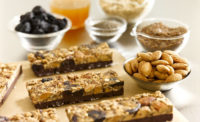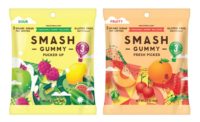Whether they’re ferrying children between school and soccer practice or pulling a few more hours at work, consumers are busier than ever. But that doesn’t mean they’re willing to compromise on nutrition.
That’s one reason why energy, snack and nutrition bars continue to gain popularity, according to a June 2016 report by Packaged Facts, a division of MarketResearch.com.
In 2015, consumers spent $6.5 billion on snack bars, occupying just over a third of of the $20-billion healthy snack market. Over the last decade, the number of adults who eat 10 or more granola, cereal or breakfast bars has grown by 46 percent, meaning these snackers eat 255 million bars every month.
And consumption isn’t expected to slow. Packaged Facts estimated consumers would drop $6.83 billion on snack bars in 2016. The projected total rises to $8.43 billion in 2020 for a compound annual growth rate of 5.4 percent.
“With people leading more on-the-go lifestyles that allow less time for formal meals, snacking is a natural solution that allows them to fulfill basic nutritional needs no matter the time or place,” says Eric Epstein, senior brand manager for goodnessknows. “The increase in occasions has led to a rise in snacking options in the marketplace, giving consumers the power to demand products that both taste good and offer nutritional benefits – something that was not always the case in the industry.”
A Mars, Inc. creation, goodnessknows features nuts, grains and dried fruit packed into four pre-portioned squares, all dipped in dark chocolate, which helps provide 100 milligrams of flavanols in each serving.
Apart from the accepted health benefits associated nuts and dark chocolate, the squares are made without artificial colors, flavors and sweeteners. The brand has also tapped into the benefits of berries by introducing three new flavors earlier this year — Mixed Berries & Almond, Blueberries & Almond and Strawberry & Peanut.
“At goodnessknows, we’re constantly listening to consumer feedback to help inform our flavor development while also keeping a pulse on the flavor trends that are being discussed in the food and snack industry,” Epstein says.
It makes sense to include almonds in goodnessknows’ newest releases. Research conducted in 2015 by the Almond Board of California indicated 35 percent of consumers associate almonds with snacking, followed peanuts (24 percent) and cashews (19 percent). Consumers cited “nutritious,” “source of energy” and “good for your heart” as health-related reasons for snacking on almonds.
Goodnessknows is not alone in using almonds. KIND Healthy Snacks, the New York-based company committed to using simple, healthful ingredients in its products, has taken applying their inherent health benefits a step further.
Launched last year, the Pressed by KIND line features products that contain only fruit, vegetables and chia, and are made without added sugars. Each bar is equivalent to two servings of fruit under USDA guidelines. Flavors include:
- Apricot Pear Carrot Beet
- Pineapple Coconut Chia
- Pineapple Banana Kale Spinach
- Mango Apple Chia
- Cherry Apple Chia
- Strawberry Apple Chia, released earlier this year.
The line, along with KIND’s other offerings, helped push it to No. 1 snack brand on Amazon, according to a best seller ranking compiled by Profitero, an online insights firm. Clif Bar and General Mills’ Nature Valley range also made the list.
While sweet, fruit-based bars will likely remain popular, especially for consumers seeking a pick-me-up in the morning or afternoon, savory flavor profiles continue to gain traction, says Paul Pruett, ceo of Mediterra.
Founded two years ago, Mediterra develops snack bars based on flavors and ingredients native to the Mediterranean region. Basil, tomato and olives are included, of course, but walnuts, bell pepper, kale and pumpkin seeds are also featured.
Pruett noted tastes of flavor-fatigued consumers are evolving beyond traditional combinations toward pairings that are more robust and offer health benefits. He pointed to Mediterra’s Kale and Pumpkin Seed bar, which, with added pea protein, has become a top seller.
“Consumers today are more educated,” Pruett says. “They’re more up to speed on what’s trending, what’s good for them, what’s not good for them.”
While Mediterra has made headway as a provider of savory bars — the company plans to introduce two more at Natural Products Expo West this month — it has sweet options as well. Mediterra recently added Lemon and Walnut and Fig and Almond to its yogurt-covered offerings.
“It’s helping us certainly to have the two platforms — both sweet and savory,” he says. “It brings the consumers back to our brand and it continues to give them a variety to choose from.”
Epstein noted goodnessknows will also introduce savory bars later this year.
“We’re embracing the sweet and savory trend and will debut combinations that will offer really unique flavor profiles that haven’t been part of our portfolio of flavors yet,” he says.
Offering a variety of flavors, formulations and nutritional benefits could be what attracts new consumers to the category and pushes sales upward, Pruett says.
“There are still many consumers that we haven’t reached, which is all good news for every nutrition bar company out there,” he says.
KIND founder launches foundation to promote public
Daniel Lubetzky, founder and ceo of KIND Healthy Snacks, has launched Feed the Truth, an independent organization seeking to improve public health by promoting truth, transparency and integrity in the food system.
Lubetzky will remove himself entirely from the organization’s activities and governance. He has assembled three unaffiliated public health advocates whose sole role is to nominate Feed the Truth’s Board of Directors. The advisors, all serving voluntarily, include:
- Deb Eschmeyer, former executive director of Let’s Move! and senior policy advisor for nutrition at the White House.
- Michael Jacobson, PhD, co-founder and president of the Center for Science in the Public Interest.
- Marion Nestle, PhD, MPH, professor of nutrition, food studies and public health at New York University.
Feed the Truth’s mission is to address the food industry’s influence in shaping nutrition policy, among other activities affecting public health. While specific programming will be decided by an executive director to be appointed by the Board of Directors, activities could potentially include grants to support investigative journalism, consumer education campaigns and educational briefings to policymakers and influencers.
Lubetzky’s donor-advised fund has made an initial contribution of $5 million to Feed the Truth. Lubetzky intends to fund an additional $20 million over the next 10 years.









